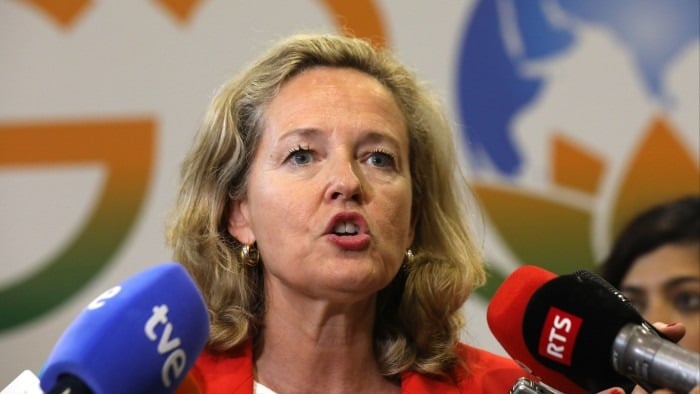Also in this newsletter: Serbia and Kosovo’s next round of (fruitless) talks
Good morning. Ursula von der Leyen laid out an unabashedly pro-business message in her big parliamentary speech yesterday, in what we interpreted as an unsubtle pitch to her centre-right party for a second term as the EU’s most powerful official. She made a number of promises to industry, resurrected Mario Draghi and threw in a competition probe against Chinese carmakers for good measure.
Today, our Madrid team explain why Spain’s finance minister wants to use tomorrow’s meeting of finance ministers to talk Latin America (and her career aspirations), while our man in the Balkans has a dim view of the latest round of Serbia-Kosovo talks this morning.
Go west
Spain has insisted the EU should not be shy about its role as a vital investor in Latin America as it has far outspent China in the region, write Carmen Muela and Barney Jopson.
Context: Spain currently holds the rotating EU presidency and is using it to promote stronger EU relations with Latin America, where it has ties as a former colonial power. Western countries have been growing uneasy over China’s increased presence on the continent.
“The EU is the biggest investor in South America, 20 times bigger than China,” said Nadia Calviño, Spain’s deputy prime minister. But she added that “the news prevents us from seeing the reality on the ground”.
She was addressing a Madrid conference yesterday that paves the way for a meeting of EU finance ministers beginning tomorrow, where Spain wants to put economic ties with Latin America centre stage.
Calviño said the meeting in Santiago de Compostela was “the first time in history” that economy and finance ministers from Europe and Latin America — around 50 people — would get together.
Noting that trade between the EU and Latin America had expanded by 40 per cent in the past decade, she said it was not time to “close in on ourselves” commercially.
“Spain has a key role to play as a door between these two continents,” she added.
However, some big European companies such as Telefónica and Enel have divested from Latin America in recent years, either to reduce their borrowing or to pare back political risk. Chinese businesses are among those stepping in as buyers.
Calviño’s speech at a conference organised by the Development Bank of Latin America (CAF) should also be seen as a pitch for her next job, as she is a leading contender to be the new head of the European Investment Bank. Expect much gossip around the meeting on that front.
She said Latin America and the Caribbean were natural partners for Europe in a “new international order based on multilateralism, democratic values . . . and social development and sustainable growth.”

Chart du jour: Misfiring engine
Disruptions, labour shortages, high energy prices and increased bureaucracy are spreading a heavy sense of gloom through Germany’s once-mighty manufacturing sector.
Balkan shuffle
Expect no breakthrough when Kosovo premier Albin Kurti and Serb president Aleksandar Vučić sit down for a new round of talks this morning to normalise relations under the tutelage of the EU.
If anything, the talks have faltered since a temporary high point in March, writes Marton Dunai.
Context: Serbia has refused to recognise Kosovo after the former Serbian province fought a brief war of independence in 1999, supported by Nato, and broke off unilaterally in 2008. The conflict has simmered since.
Relations suffered a setback earlier this year following a fallout over regional elections, despite high hopes of a settlement during negotiations in March. The sides have met a handful of times since, doing little more than repeating their positions.
As he prepared for today’s meeting, Vučić told the FT he again expected little more than a commitment to avoid violence. “I believe we will be able to deliver a message of peace. But do I believe [there will be progress]? I don’t,” Vučić said.
He said Belgrade would move only once Kosovo gives extra rights to the ethnic Serb community in Kosovo, especially the so-called Association of Serb Majority Municipalities (ASM) in the north of the country.
“We need to see finally the deliverance on ASM, and then we will be able to deliver everything from our side that we have said so far,” Vučić said. That includes Serbia not objecting to Kosovo’s membership in international organisations.
Negotiations also remain stuck because the big picture is not changing.
“For me it’s one country,” Serb premier Ana Brnabić said last month. “There are no two countries, no both countries. Kosovo is not an internationally recognised country, not a member of the UN.”
Kurti, sitting stone-faced on the same panel of regional leaders, shot back, saying that a large majority of western states do recognise Kosovo.
As we said, expect no breakthrough.
What to watch today
European Central Bank makes a decision on interest rates.
EU finance ministers arrive in Santiago de Compostela ahead of their two-day meeting.
Now read these
Taken against their will: There is a race against time to recover thousands of Ukrainian children who were abducted by Russia.
Fico, 2.0: Russia-friendly parties are expected to make a comeback in Slovakia’s election.
Global South: Patronising, factually inaccurate, a contradiction in terms and polarising — the phrase must be retired, writes Alan Beattie.



